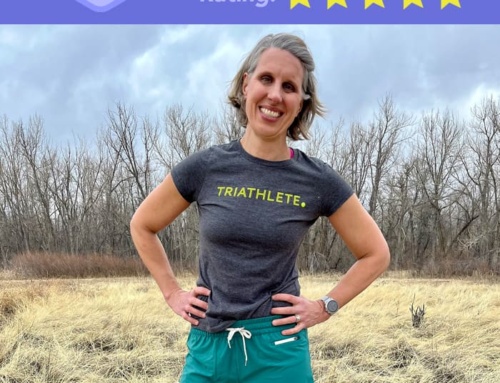I was on Denver Public Library website a few weeks ago and saw that the mobile version of StoryCorps was coming to town. I jumped on it. StoryCorps, in case you’re not an NPR geek like me, are 40-minute conversations between any two people–relatives, friends, employees–that are recorded and archived in the Library of Congress. Small segments of a small portion of interviews are broadcast weekly on NPR stations. Because I love the pieces and because I never know what to get my mom for gifts, I signed us up for a session for her birthday.
If your family is anything like mine, you “hear” the same stories again and again: when Sarah, my little sister, split open her chin on a patch of ice; when I decided to see if my lip would really stick to a the frame of a hockey net (it did, oh, how it did); when Megan, my older sister, bought a head-to-toe outfit from The Limited that a couch from the 70’s would’ve been proud to wear. The words circulate at gatherings, but I’m not sure anybody really hears them. I know I don’t.
I wanted to hear (and record) my Mom’s history, her stories, her thoughts, her advice, minus the drama that comes with the wine and emotional baggage that always get served with family meals. I did my best to listen to her words during our conversation, but I fully admit, I am not a good listener. Part of that comes from the patterns my job–during an interview, I ask a question, then as I type the answer, I think about a follow-up q.–but most of it comes from impatience and familiarity.
On a good day, I listen to my kids maybe 50% of the time, which is likely why they only listen to me half the time too. (“WHERE ARE YOUR SHOES? GET THEM ON!” I bellow regularly, so annoyed that this is the fifth time I have to ask.) Ben is a total chatter, and I just can’t process everything he says, especially when he gets going on Star Wars. Amelia is more reticent, but the noise that surrounds those two makes me subconsciously tune out. And I’ve been with Grant for long enough to know his speaking habits and his typical responses. I shouldn’t take them for granted, but I do. (To wit: I’ve stopped asking him what he wants for dinner, because he always turns it around and asks me what I want. So not helpful.
Because I can’t seem to stop striving–and because I need to channel my non-running-energy somewhere–I am trying to listen better. (StoryCorps calls listening an act of love. I want in on that action.) That means keeping my mouth shut. For longer than is comfortable. And when I open my mouth, not having some response I’ve already formulated. Just like most patterns in my life–I drink skim milk; I hate heavy metal; I lose most of my ability to function after 9:30 p.m. –it’s hard to break.
So I’ve decided to start with regularly listening to one thing I have the most control over: myself. Yeah, I realize it’s not much of a conversation, but it’s a start. I’m trying to listen to my body, which might be the best thing you can give yourself as a runner.
Listen for the times it wants to rest, even when you want to go. (Really tune in: is it super tired, or is it just trying to fake you out?) Listen to your knee when it tells you that it really doesn’t want to go another three miles, thank you very much. Listen to the whispers that tell you to try a longer distance. Don’t just immediately shut them up, assuming they clearly don’t know your limits. Listen to the what-if’s that are wondering if you can go faster or get up that hill. If they’re wondering, it’s likely you can. Listen to your muscles sing after a good run, your pride pounds as you cross the finish line.
Tune in, and you’ll hear yourself in ways that could be music to your ears. Sorry: really bad cliche. I couldn’t think of something better. It’s nearing 9:30, after all.
How are your listening skills? With your body? Kids? And, if you want to go there on a Monday, your significant other?








I totally wish they had that in Canada! I haven’t figured out a good way to ask my mum to write her memoirs (she’s only 60) without her being offended that I think she might die without writing it all down! :)
I’m a great listener. However, when it concerns:
Me: I listen to my brain too much when it tells me that I can run another day.
My son: he deserves my attention more, but I can only take so much of the 24/7 motor-mouth. To be fair, he’s 4-1/2 and *very* articulate (we call him Mr. Random). He definitely needs to work on listening to us! Please tell me this is an age-related issue…
My spouse: We’re actually pretty good. Unless he’s playing video games or I’m on the computer.
Oh how I miss NPR – I catch it streaming online when our connection is good but it’s not the same as having it on the car for those long traffic light days! I never knew that StoryCorps even existed until I came across a book about it last year. I couldn’t put it down – or was it audio? I can’t remember. All I do remember is crying – a lot – to all the stories. People were so honest in that little can of a recording studio.
I have certainly grown as a runner and as person throughout this year long journey to my Marathon…I have become better and better at listening to my body and being able to tap into “is this a good pain or a bad pain?” and “do I really need to walk or do I just want to walk!”
I have not really improved my listening skills for my husband though. He’s just gone so much that I rarely even calculate him into the schedule. I know that when we get back to the states our lives will slow down – for multiple reasons…and even speed up in other areas. BUT regardless – we still make a connection at least once a day and that makes me still feel important to him and visa versa.
This was lovely… I bet every mother in the world suffers from this on some level. We barely have time to listen to our husband & children and their constant chatter about (some toy as seen on TV… and that’s not even including what my kids chat up)… which of us really takes the time to stop and really listen to ourselves?
I honestly thing that’s what happened to my marathon. On Friday morning, around mid morning, I remember thinking, “well that’s odd” when I got a hot flash, but I never stopped to listen to my body. I assumed it was faking me out, pre-race nerves. I have to wonder if I’d stopped and just asked for quiet for a minute, if I would have heard the whispered distress call before I set out to run a marathon on Saturday.
Perhaps. Perhaps not. I’m pretty tuned out sometimes. Just ask the guy I’m married to… the one who’s really convinced he needs that (something or other).
Love this comment, G. Sorry to hear your marathon might have been not what you expected, but chalk it up to a learning experience? Or something like that.
OMG, I think I said (yelled) get your shoes on 50 times yesterday. And yep, it is probably the not listening that has gotten me in this daily situation. Glad to read this and know I am not alone.
My listening skills with my body are definitely getting better. When I was younger, I would just go go go all the time and push myself when shouldn’t. Now that am a thirty-something, that has changed. I would rather take a few days off than risk losing months from running. With respect to my spouse and kids, my listening skills could use some practice. I sometimes feel like a general in my house! That being said, if I didn’t stay on the kids and husband, nothing would ever get done!
Jessica: this comment reminds me of a conversation I had with my friend Amanda. She said her running is so important to her that she can’t risk being injured. She’s happy to be last in her Crossfit class because she’s so tuned into form and such. Smart: leave the ego at home.
Nice post, Dimity.
Love this post and am applying it myself…immediately! Also I want that tshirt!
Totally off topic- but I just want to say that Dimity- you have the best smile in the world! It makes me smile!!
Karen, you can go off topic anytime. :) Thanks for making me smile.
That’s such a wonderful gift to give your mom! My listening skills could use some work – I teach 2nd grade and have learned to tune out a tremendous amount. I notice it when I get home too, and my hubby starts to tell me the ins and outs of his day. Guess I’ll have to train my ears to listen like I train my legs to run. I want that shirt too!
As a high school teacher, I can hear a cuss word from across the room. My kids ask me how I can hear so well! As a mom, I think I am deaf. I agree that I totally blank out when the kids are into a long story about some part of their day. I find myself asking for the point of the story. Darn it! I should listen to all their little details as they won’t be in my house forever and I will be stuck listening to just my husband and my dogs. =) My biggest listening failure is that I need to listen more to God. I listen to music, I turn on the TV, but I never have just silence to “Be still and know.”
As for listening to my body, I do pretty good with that. I have some aches and pains at 43 years old that I have to push through, but I don’t push so hard that I end up unable to get out on the road. I think we all need that time just for ourselves, even if it is challenging and sweaty! Have a great week and enjoy your time on the road.
Thanks Vicki. LOL at the line: what’s the point of this story? And love that you can hear a swear word from across the room. Must be a pre-req to be a HS teacher.
I saw a counselor when I was early on in being married nearly 20 years ago. One thing he told me has really stuck. “Do not be afraid of the silence”. Growing up if it was quiet that meant the other shoe was getting ready to fall. It was dysfunctional and very scary at times. Quiet was not a good thing. As a result, when a friend, coworker or significant other was really quiet, I was afraid. Something HAD to be wrong. So I filled the silence by talking incessantly. That, of course, became a problem. He told me not to fill the silence. To let other people just “be”. That quiet could be a blessing and to embrace it. I immediately put his advice to work. It’s amazing!! I’m such an extrovert so it was difficult at first, but I noticed that when I’m quiet others eventually talk. If you just give people a chance to process, come out of their shells, etc… they open up. Think of all the insight I would have missed out on the last 2 decades had I talked to fill the silence. It’s helped in every aspect of my life – kids, spouse, friends. Do not be afraid of the silence. Breathe and listen
OH!! I want that shirt!!!
That is great advice, Jennifer. My husband is pretty quiet by nature, and I’ve finally–after nearly 15 years together–learned not to take in personally. At least most of the time. :)
If you’re truly “living in the moment” and are grateful and thankful for family members, you should take every opportunity you can to “build them up” and encourage them to be their best selves.
After going through cancer at a young age (I think 42 is too young for that) I have learned to live life at a different pace and with a different goal.
And when I can’t be pleasant to them anymore and can’t think of anything nice to say, I GO FOR A RUN!
p.s. and then I also have a BEER
Sorry to hear about your diagnosis, Carolyn…42 is definitely too young. Thank you for sharing your perspective. I have a sign in our kitchen that says “Be Nice or Leave.” I need to take that advice more often.
I think of myself as a good listener but I don’t always hear what people are saying (my 12 yo son likes to talk about Pokemon, Star Wars, and what was that?? I don’t know). I hear my husband talking to me but have no idea what he was saying, especially if I am in the middle of reading or typing or in a completely different room. My body…well, after my first DNF at the Seacoast Half Marathon yesterday, I would call myself a super listener. Things were going so well and I was hanging with the 9 min/mile pace group, on target for a big PR! At mile 3, 27 minutes on my garmin. I can do this! At mile 3.9, my left soleus gave me a twinge and I backed off and let the pace group pull ahead. At mile 4.5 I felt a pop and knew I had to stop. There will be other races mainly because, in some aspects of my life, I am a good listener.
Way to go, Erica. Sorry about the pop, but SO GLAD you listened. xo.
That is so awesome. I work with people that have Alzheimer’s. Those stories that we hear six thousand times are what families need recorded. Every 69 seconds someone gets diagnosed with Alzheimer’s. Can you imagine what a difference it would make if their caretakers had those stories. Wow! I have goosebumps just thinking about this. Sights, Sounds, Memories, Feelings, Emotions all wrapped up in one segment can explain so much about a person. That is a beautiful gift to give your Mom and really yourself as well.
I need to work on my listening skills. I am just as often found yelling get your socks and shoes on so we can go than to really listen to what my kids are telling me. Thank you for reminding me to listen to what is going on around me.
Hey Jenny: what good work you must do. Storycorps has a memory loss initiative: check it out: http://storycorps.org/initiatives/mli/
Might be something you could use.
I love StoryCorps–most of the those stories leave me in tears in my car. Any idea when yours will be on?
Training for TCM and getting a seemingly sudden, out of the blue injury did make me stop in my tracks and wonder if I was missing signs my body was sending me. I’m sure there was something before the knife like pain in my hip but I was probably too distracted to notice – busy on my runs staring at my garmin, talking with friends, singing in my head or lost in thought. At TCM I ditched the music and loved being in the present moment and now I’ve ditched the garmin, too so I can run by feel. The few runs I’ve had in the last 6 weeks I’ve listened to my body wholeheartedly, which meant sometimes stopping early. I just started a break from running so my hip can heal and have time to throw myself back into yoga, which also helps me tune into my body…. and learn to accept what it has to say.
Jo: I doubt our interview will make it on the air. But thanks for asking. Just a small portion get on, which is fine with me: it was more about the conversation and the connection between us.
Way to get your ohm on, sister. :)
I love this! I am so not a good listener…I sometimes tune my kids out after, “Hey, mom?” I am SO guilty. I get onto my 9-year old for not listening, but I don’t listen, either!! I’m also very bad at listening to my body. Case in point, I was feeling crummy Saturday morning and it was raining, but I pushed myself to go run anyway and ended up sick all weekend. Thank you for the reminder that listening is an act of love!! I need to listen a LOT more, to my kids, to myself, just in general. I resolve to do better.
What a great present for your mom! My husband’s birthday is coming up and I wish I had known about this. Oh well, back to Plan A–a cooking class. Because unlike me, he actually likes to cook.
Great post as always, Dimity!
Love the shirt! I know my kids and husband can hear me, but I’m pretty sure that the opposite species was built with a Mom-dial, and when Mom is talking in a higher or louder pitch than normal, they tune that dial down to zero. They hear me just fine, they just don’t pay attention.
I think listening is a skill that can be learned and improved, and working on it is, for sure, love. Thanks for bringing it up, Dimity. I am going to practice more.
My kids: I catch myself NOT listening to them all the time. (Oh no, what did I just say yes too?)
My body: Well I only listen when it YELLS at me.
My intuition: The older I get, the better I listen.
I love, love, love Storycorps. The stories almost always make me tear up! What a neat idea for a gift for your mom – I love it!
I go through periods where I listen well, and then periods where not so much. It’s hard to listen well all the time – so it’s good to have these reminders. I do find when I listen more, I hear some pretty great things. My son has an amazing imagination and he comes up with some crazy funny ideas. My husband loves to share stories with me – and I do tune him out sometimes, but he’s got some neat things to share too when I listen. I try to listen to my body – especially after going through PF last summer, but once in a while I don’t listen carefully enough and do regret it (which is how I got deep into the PF last spring). My other problem is that I am often over analyzing things, so I tend to not trust my instincts! I need to work on that!
This past summer I started feeling not so great, run down, crampy, just blah symptoms kept getting worse and I kept telling my husband that something isn’t right with my body. I had been to my primary doctor who said i had pulled a muscle in my back my gyn said i had a kidney infection…. after another visit to the gyn and STILL feeling horrible. I started to think I was the crazy one. Well I ended up in the hospital emergency room and having surgery 2 days later! after that I tell everyone who isn’t feeling so great to listen to what their body is telling them. This all happened 3 weeks before i was to run my 2nd 1/2…………I was freaking. My time was great but I finished. As for listening to the kids LOL I am glad to hear I am not the only mom who listens to half the story or wonders what the punch line is!
As for my husband we both listen when it’s really needed!! Thanks for a great story and BTW, I LOVE THE SHIRT!!!
Oh my gosh, I have so missed this website, I don’t know why it has taken me so long to get back on it! (apart from the fact that I was injured last summer and drifted off the running thang!! )
I also think of myself as a good listener…until it comes to my children. I feel awful saying this but they don’t even make it to the table for their after school snack before I am already tuning them out, my eyes glaze over and I just nod and mmmmm hmmmmmm a few times! I really must make myself listen more because they will be grown up before I know it…
I expect them to listen to me and follow instructions first time….I start off asking them to do something in a nice quiet voice…by the time I get to the 5th or 10the time I am usually screaming…and then they look at me like………what are you shouting for??!! Lol!
Back to the running…I am signed up for my 1st half marathon, the Zooma half in Atlanta next weekend and am soooooo ready, cannot wait to do this…not sure how I will do but am determined to see it through and enjoy every moment….and to LISTEN! ;-).
How cool! I wish I’d known earlier when the Storycorps folks were in my home town. I didn’t, and missed my chance to record an interview with my dad. What a wonderful thing you did.
I LOVE THIS! need it now…